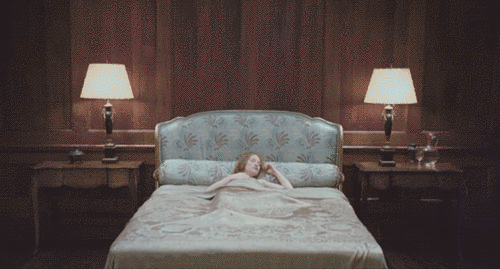Sleeping Beauty (2011)
I can be your china doll, if you wanna see me fall
Most definitely not to be confused with Disney’s dazzlingly happy-ended animated princess fairytale; Julia Leigh’s live-action film echoes a very mature, serious and disturbing take on prostitution and the unconscious state. Amongst the time of the fairytale re-releases splurge in cinema and TV (Red Riding Hood (2011), Beastly (2011), Snow White and the Huntsman (2012), Mirror Mirror (2012) and Once Upon A Time series (2011-2012) anyone?), Sleeping Beauty is by far the most ambitious, experimental and intriguing. And yet somehow this film seemed to slip off the radar quite without creating any of the impact of the before mentioned blockbusters.
But when tracing the roots of this fairytale it is easy to see how the original story was lost in translation by the Big Mouse’s sprinkling of fairydust…Although only loosely based on the fairytale itself, Leigh grasps hold of the pivotal ending to the Brothers Grimm story using this to consequently generate a much darker and provocative story.
As for the Brothers Grimm, Sleeping Beauty (or Little Briar Rose as they named it) was not a child-friendly tale of magic, love and happiness like its Disney and subsequent counterparts. No kiss of love awakened the ‘Beauty’ from her bewitched slumber. In fact there was no bewitched slumber but fate only that led to her long term comatose state. And the Prince was not the hero of the story but the King quite the anti-hero, raping the helpless girl who thus awakes by the birth of her child. Grimm isn’t it?
How does all of this tie with the Australian motion-picture? The ‘Beauty’, played by Emily Browning, offers to trial an experimental drug, in order to help her student finances, which leaves her in a prolonged unconscious state at the hands of rich and sexually unfulfilled older men. The business is kept very much secreted by the lady that runs the manor house, Clara; which ultimately recreates an upper-class prostitution chain.

The film is mystically beautiful through its image of the helpless body in sleep. It switches perfectly between silence and the same ballad-like music to show the otherworldly state of Lucy which the viewer is let into. The voyeuristic concept of the viewer is controlled maturely making the viewer experience Lucy’s abstract helplessness, balancing the uncomfortable imagery with that of territory that is quite unknown. The viewer is captivated – perhaps unwillingly – to Lucy’s story, unable to look away despite the most unpleasant subject matter.
As a film it deals with an array of tricky subjects – rape, prostitution and drug abuse being the most prominent – which are left quite unfinished or else overdone to the point of unwatchable in many films. Leigh takes such a different approach though dealing with the subjects starkly and yet so delicately at the same time. The repetition of ‘no penetration’ makes the film perhaps more intriguing with the barriers of rape and how the emotional states of the men are each developed in the ten minutes or so sequences the viewer sees of them alone with Lucy. Somehow Leigh is able to show such helplessness of all the characters leaving the viewer marvelling at the decrepit bodies of the fully conscious men both in physicality and mentally. By the end of the film Clara too is reduced to a fragile state. This decline in the human body emotionally, physically and literally (in sleep) pushes such an impact that a viewer is left stunned and quite absorbed by the end.
Emily Browning plays her role with such beauty, precision and innocence. The moments of her pale bare flesh contrast beautifully against the somewhat faded powdered backdrops of pinks, browns and nudes. Her character is truly eye-opening and fascinating but believably so, connecting the viewer to her powerless and exposed state. Her simplistic beauty is intriguingly tinted and her elegance sacrificed by the ending, showing how such a life consumes and maims the body and mind.
Overall the film’s underlying sinisterness and fall from innocence and capability is truly fascinating. The original fairytale is re-mastered to address serious and damaging issues that are so beautifully and terrifyingly captured that a viewer has no choice but to watch the end credits roll is marvel.
What inspired me: The psychology of the characters and the powerlessness of both body and mind. The fairytales of the Brothers Grimm.
Originally published 9th September 2012
